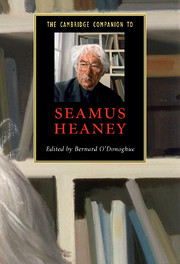Book contents
- Frontmatter
- 1 Introduction
- 2 Seamus Heaney’s Working Titles
- 3 The Context of Heaney’s Reception
- 4 Heaney in Public
- 5 Heaney and the Feminine
- 6 Heaney and Eastern Europe
- 7 Heaney’s Classics and the Bucolic
- 8 Professing Poetry
- 9 Heaney and the Irish Poetic Tradition
- 10 Irish Influence and Confluence in Heaney’s Poetry
- 11 Heaney and Yeats
- 12 Heaney’s Wordsworth and the Poetics of Displacement
- 13 Heaney, Beowulf and the Medieval Literature of the North
- 14 Crediting Marvels
- Guide to Further Reading
- Index
12 - Heaney’s Wordsworth and the Poetics of Displacement
Published online by Cambridge University Press: 28 March 2009
- Frontmatter
- 1 Introduction
- 2 Seamus Heaney’s Working Titles
- 3 The Context of Heaney’s Reception
- 4 Heaney in Public
- 5 Heaney and the Feminine
- 6 Heaney and Eastern Europe
- 7 Heaney’s Classics and the Bucolic
- 8 Professing Poetry
- 9 Heaney and the Irish Poetic Tradition
- 10 Irish Influence and Confluence in Heaney’s Poetry
- 11 Heaney and Yeats
- 12 Heaney’s Wordsworth and the Poetics of Displacement
- 13 Heaney, Beowulf and the Medieval Literature of the North
- 14 Crediting Marvels
- Guide to Further Reading
- Index
Summary
In an admired poem in the sonnet series ‘Clearances’ in memory of his recently dead mother, Seamus Heaney recalls her death in this way:
. . . we all knew one thing by being there.
The space we stood around had been emptied
Into us to keep, it penetrated
Clearances that suddenly stood open.
High cries were felled and a pure change happened.
(‘Clearances’, vii; HL 31)
It may not be surprising that ‘The Thorn’ is the poem by Wordsworth which Heaney, after an opening discussion of the bog-like spots of time in The Prelude, chose for his point of focus in his crucial essay ‘Feeling into Words’. At the centre of that Romantic poem is a cloaked, threatening, but also compelling female figure. She embodies what Wordsworth in The Prelude and elsewhere describes as Nature’s vexed, redundant energies, its reflexive and recursive return of acts of human aggression towards her secret places. In the concluding pages of his essay Heaney puts that figure into a more specifically Irish context. Referring to the ‘religious intensity of the violence’ in Northern Ireland as ‘a struggle between the cults and devotees of a god and a goddess’, he calls that goddess an ‘indigenous territorial numen, a tutelary of the whole island’, citing the names given to her in Ireland: ‘Mother Ireland, Kathleen Ni Houlihan, the poor old woman, the Shan Van Vocht, whatever’. Known earlier in Irish legend as ‘Sovereignty’, that female figure’s very name ‘has been temporarily usurped by a new male cult whose founding fathers were Cromwell, William of Orange and Edward Carson . . . What we have is the tail-end of a struggle in a province between territorial piety and imperial power’ (P 57).
- Type
- Chapter
- Information
- The Cambridge Companion to Seamus Heaney , pp. 178 - 191Publisher: Cambridge University PressPrint publication year: 2008



